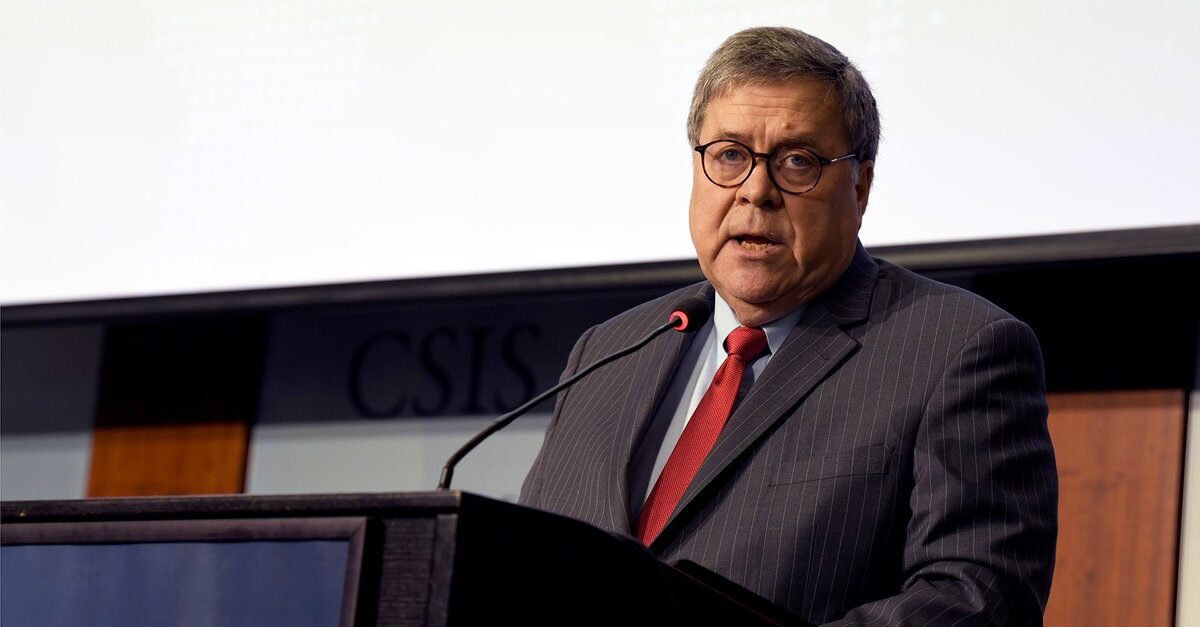
Could it be that Attorney General Bill Barr is simply a company man for the White House, ready to intervene in the political sphere to prevent a Republican president from falling victim to one-term status?
A Wednesday story in the Wall Street Journal framed a recent speech by the 77th and 85th attorney general–as well as other extant and upcoming late-year priorities and appearances–as having “dovetailed with President [Donald] Trump’s law-and-order campaign message.” The article goes on to say that Barr’s efforts “show a pattern of prioritizing” Department of Justice (DOJ) resources “in a way that could boost Mr. Trump’s re-election chances,” according to critics.
The speech in question–and the putative focus of the article–is Barr’s focus on bringing home a slew of prosecutions and convictions on federal firearms crimes–as well as anything they can get to stick against demonstrators who took part in Black Lives Matter protests over the summer following the police killing of George Floyd.
This is complete retread of Barr’s work in 1992 when another unpopular GOP incumbent was steadily seeing his reelection chances dwindle by the day.
In February of that year, as then-president George H.W. Bush was on the ropes due to a not-so-stellar economy, the Wall Street Journal ran a story with the headline: “Attorney General Barr, Targeting Violent Crime, Comes on Like Gangbusters in a Campaign Year.”
Per the article:
When President Bush chose William Barr to be attorney general last October, the nomination was hailed as a choice of competence over political stature or ideology. …
But now that he has the country’s top law-enforcement job, Mr. Barr has put a heavy emphasis on attention-grabbing events and pronouncements that may have more to do with presidential election year politicking than with fighting crime on the streets…
The story goes on to catalogue four distinct areas and incidents presumed to have been campaign-themed–one of which was outright described as “unusual” by author Paul M. Barrett.
Notably, in what would become a sort of perennial stance for Barr and the GOP years before it became a matter of bipartisan consensus, he promised at the time to deluge the U.S.-Mexico border with new immigration enforcement agents in order to “combat illegal immigration and violent crime by criminal aliens.”
The 1992 story relays another strikingly on-the-nose similarity between Barr’s election-year priorities past and present.
“Under Mr. Barr, urban gang violence–ordinarily considered a state or local police concern–has suddenly become the Justice Department’s top priority,” the Journal‘s Barrett notes.
The modern day equivalent of the above, currently the focus of conservative periodicals and politicians across the country, is: fears of crime surges in New York City, an ever-present focus on Chicago’s vertiginous murder rate, the president’s constant and false admonitions about the “worst” and “most dangerous” cities, all of which he claims are “Democrat-run.” The list here goes on.
And, while the 45th president has complained about Barr’s ability to hand down federal indictments over the long-running inquiry into the Russiagate inquiry, Wednesday’s Journal story nonetheless bolsters an image of a company man willing even to carry out political errands.
WSJ journalist Sadie Gurman herself noted the resemblance between then and now, pointing to Barr’s “unusual public announcements highlighting efforts to fight crime as Bush faced re-election.”
A 1992 @WSJ story headlined “Attorney General Barr, Targeting Violent Crime, Comes on Like Gangbusters in a Campaign Year” said Barr held a number of unusual public announcements highlighting efforts to fight crime as Bush faced re-election. w/@aviswanatha https://t.co/n5CP6ZMOg8
— Sadie Gurman (@sgurman) October 14, 2020
Barrett’s original story–which is not an opinion piece–uses terms like “theatrics” and “old news” to describe Barr’s election-year barnstorm. The author anonymously quoted federal agents and others as describing Barr’s heavy-handed showmanship as “for show” and an embarrassing example of “extreme overkill.”
The attorney general is now widely regarded—particularly by congressional Democrats, DOJ alumni and legal pundits—to be a fiercely partisan player who operates the DOJ like a political agency.
But in 1992, his critics were apparently surprised by such behavior. Sen. Chuck Schumer (D-N.Y.), then a member of the U.S. House of Representatives, hoped that Barr would stop the politicization of the Department of Justice.
“In a department that has been highly politicized, the appointment of someone who has never run for office nor is expected to is most welcome,” the New York City Democrat said. “I hope he will be able to reverse the trend of politics at the Department of Justice.”
[image via the U.S. Department of Justice]